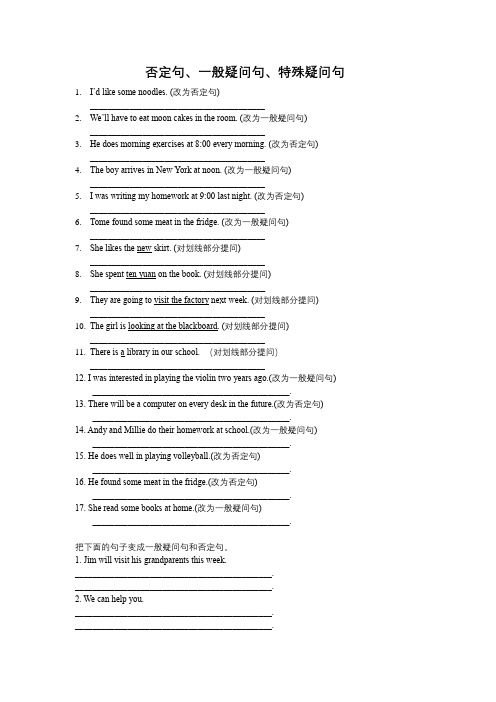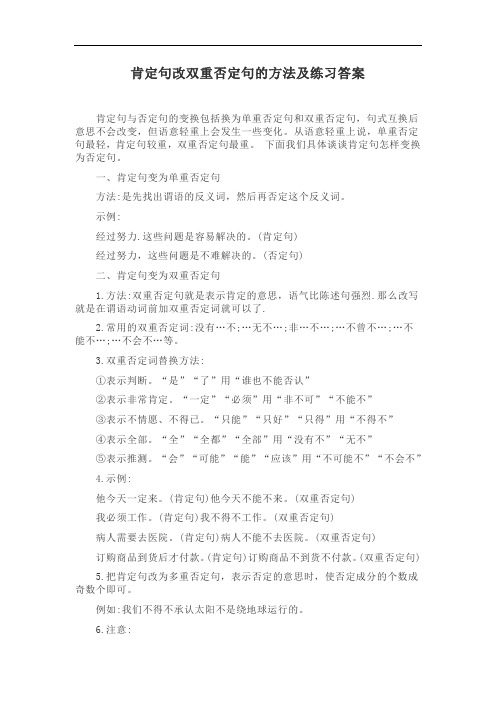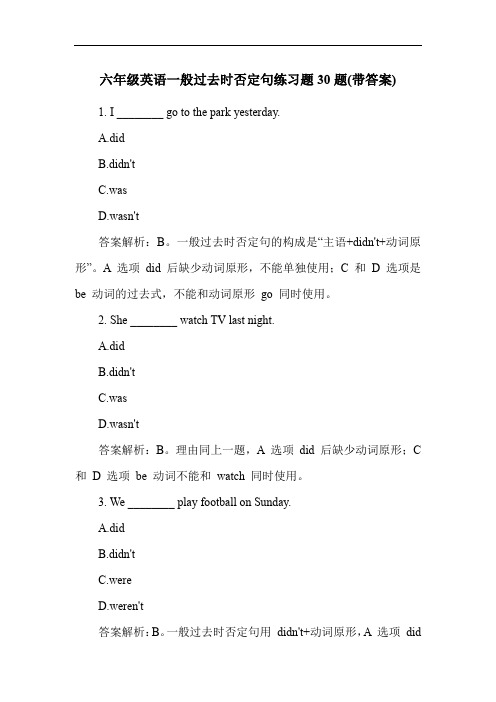六年级否定句练习题
小升初英语句型:否定句、一般疑问句、特殊疑问句专题练习(试题)-英语六年级下册通用版

否定句、一般疑问句、特殊疑问句1.I’d like some noodles. (改为否定句)________________________________________2.We’ll have to eat moon cakes in the room. (改为一般疑问句)________________________________________3.He does morning exercises at 8:00 every morning. (改为否定句)________________________________________4.The boy arrives in New York at noon. (改为一般疑问句)________________________________________5.I was writing my homework at 9:00 last night. (改为否定句)________________________________________6.Tome found some meat in the fridge. (改为一般疑问句)________________________________________7.She likes the new skirt. (对划线部分提问)________________________________________8.She spent ten yuan on the book. (对划线部分提问)________________________________________9.They are going to visit the factory next week. (对划线部分提问)________________________________________10.The girl is looking at the blackboard. (对划线部分提问)________________________________________11.There is a library in our school. (对划线部分提问)________________________________________12. I was interested in playing the violin two years ago.(改为一般疑问句)_____________________________________________.13. There will be a computer on every desk in the future.(改为否定句)_____________________________________________.14. Andy and Millie do their homework at school.(改为一般疑问句)_____________________________________________.15. He does well in playing volleyball.(改为否定句)_____________________________________________.16. He found some meat in the fridge.(改为否定句)_____________________________________________.17. She read some books at home.(改为一般疑问句)_____________________________________________.把下面的句子变成一般疑问句和否定句。
部编六年级语文肯定句改双重否定句的方法及练习答案

肯定句改双重否定句的方法及练习答案肯定句与否定句的变换包括换为单重否定句和双重否定句,句式互换后意思不会改变,但语意轻重上会发生一些变化。
从语意轻重上说,单重否定句最轻,肯定句较重,双重否定句最重。
下面我们具体谈谈肯定句怎样变换为否定句。
一、肯定句变为单重否定句方法:是先找出谓语的反义词,然后再否定这个反义词。
示例:经过努力.这些问题是容易解决的。
(肯定句)经过努力,这些问题是不难解决的。
(否定句)二、肯定句变为双重否定句1.方法:双重否定句就是表示肯定的意思,语气比陈述句强烈.那么改写就是在谓语动词前加双重否定词就可以了.2.常用的双重否定词:没有…不;…无不…;非…不…;…不曾不…;…不能不…;…不会不…等。
3.双重否定词替换方法:①表示判断。
“是”“了”用“谁也不能否认”②表示非常肯定。
“一定”“必须”用“非不可”“不能不”③表示不情愿、不得已。
“只能”“只好”“只得”用“不得不”④表示全部。
“全”“全都”“全部”用“没有不”“无不”⑤表示推测。
“会”“可能”“能”“应该”用“不可能不”“不会不”4.示例:他今天一定来。
(肯定句)他今天不能不来。
(双重否定句)我必须工作。
(肯定句)我不得不工作。
(双重否定句)病人需要去医院。
(肯定句)病人不能不去医院。
(双重否定句)订购商品到货后才付款。
(肯定句)订购商品不到货不付款。
(双重否定句)5.把肯定句改为多重否定句,表示否定的意思时,使否定成分的个数成奇数个即可。
例如:我们不得不承认太阳不是绕地球运行的。
6.注意:由肯定句变成双重否定句或否定的反问句时.千万不要把意思说反了。
须知:双重否定表示肯定,三重否定还是表示否定(单数否定还是表否定)。
下列三句是把意思说反了的例子。
a.科学发展到今天,谁也不会否认地球不是围绕太阳转这个简单的事实.b.老一辈革命家无时无刻都在关心青年一代的成长。
c.难道能否认《红楼梦》不是一部很好的古典小说吗?分析:a出现三重否定。
否定句练习题六年级

否定句练习题六年级一、否定句的概念和基本规则在英语语法中,否定句是指对肯定陈述句的否定表达。
通过在句子中加入否定形式的助动词或副词,可以改变句子的意义。
下面是关于否定句的练习题,旨在帮助六年级学生掌握否定句的基本用法和结构。
二、否定句练习题1. He is a doctor.2. They are playing in the park.3. She has a pet dog.4. We go to school by bus.5. I can swim very well.6. My brother likes to eat pizza.7. The cat is sleeping on the chair.8. The teacher will give us a test tomorrow.9. Jack and Jill went up the hill.10. The birds are singing in the trees.三、答案及解析1. He is not a doctor.解析:在肯定句中,加入否定形式的助动词“not”,变成否定句。
2. They are not playing in the park.解析:同样地,加入“not”来构成否定句。
3. She does not have a pet dog.解析:在这个句子中,使用助动词“does”与动词原形“have”连用,还要加上“not”。
4. We do not go to school by bus.解析:同样地,使用助动词“do”与动词原形“go”连用,再加上“not”。
5. I cannot swim very well.解析:这个句子中使用了否定形式的情态动词“can't”,表示“不能”。
6. My brother does not like to eat pizza.解析:使用助动词“does”与动词原形“like”连用,再加上“not”。
六年级英语一般过去时否定句练习题30题(带答案)

六年级英语一般过去时否定句练习题30题(带答案)1. I ________ go to the park yesterday.A.didB.didn'tC.wasD.wasn't答案解析:B。
一般过去时否定句的构成是“主语+didn't+动词原形”。
A 选项did 后缺少动词原形,不能单独使用;C 和D 选项是be 动词的过去式,不能和动词原形go 同时使用。
2. She ________ watch TV last night.A.didB.didn'tC.wasD.wasn't答案解析:B。
理由同上一题,A 选项did 后缺少动词原形;C 和D 选项be 动词不能和watch 同时使用。
3. We ________ play football on Sunday.A.didB.didn'tC.wereD.weren't答案解析:B。
一般过去时否定句用didn't+动词原形,A 选项did后无动词原形;C 和D 选项be 动词后不能跟动词原形play。
4. He ________ read a book in the morning.A.didB.didn'tC.wasD.wasn't答案解析:B。
一般过去时否定句结构是didn't+动词原形,A 选项did 后缺动词原形;C 和D 选项be 动词与read 不能同时使用。
5. They ________ go swimming yesterday afternoon.A.didB.didn'tC.wereD.weren't答案解析:B。
一般过去时否定句为didn't+动词原形,A 选项did 后无动词原形;C 和D 选项be 动词不能与go swimming 搭配。
6. I ________ have breakfast this morning.A.didB.didn'tC.wasD.wasn't答案解析:B。
六年级英语一般过去时否定句单选题40题

六年级英语一般过去时否定句单选题40题1. Tom _________ play football yesterday.A. didn'tB. don'tC. doesn'tD. isn't答案:A。
本题考查一般过去时的否定形式。
一般过去时的否定句结构是“主语+ didn't + 动词原形”,A 选项“didn't”符合;B 选项“don't”用于一般现在时;C 选项“doesn't”用于一般现在时第三人称单数;D 选项“isn't”是be 动词的否定形式,不符合本题要求。
2. They _________ go to the zoo last weekend.A. didn'tB. don'tC. weren'tD. aren't答案:A。
此题考查一般过去时的否定表达。
一般过去时否定句用“didn't + 动词原形”,A 选项“didn't”符合,后面接动词原形“go”;B 选项“don't”用于一般现在时;C 选项“weren't”是be 动词的过去式否定形式,后面不能接动词原形;D 选项“aren't”是be 动词的现在时否定形式。
3. My mother _________ cook dinner yesterday.A. didn'tB. doesn'tC. don'tD. wasn't答案:A。
本题主要考查一般过去时的否定句。
一般过去时否定用“didn't + 动词原形”,A 选项“didn't”正确,后接动词原形“cook”;B 选项“doesn't”用于一般现在时第三人称单数;C 选项“don't”用于一般现在时;D 选项“wasn't”是be 动词的过去式否定形式,后面不能接动词原形。
六年级复习题双重否定句

如:燕子飞过大海,肯定非常辛苦、艰难。 燕子飞过大海,不可能不辛苦、艰难。
她觉得一定要这样做。 她觉得非这样做不可。
3.表示不情愿、不得已。 “不得不”——“只能”“只好”“只得”
如:爹妈都不在家,只好自己动手做饭了。 爹妈都不在家,不得不自己动手做饭了。
4表示全部。 “没有……不”“无不”—— “全”“每”“全都”“都”
如:在共产党面前,什么困难都能 克服。 在共产党面前,没有困难不能克服。
5表示推测。 “不可能不”“不会不”——“会”“可 能”“能”“应该”
如:每一个孩子都应该爱自己的母亲。 每一个孩子不可能不爱自己的母亲。
6.表示存在。 “不是没有”——“有”
如:这篇文章还是有希望发表的。 这篇文章不是没有希望发表的。
双重否定词用法的总结
1.表示判断。 “不能不”“谁也不能否认”——“是”等
2.表示肯定。 “非......不可......”“不能不””不得不“——“一定”“必 须”“肯定”“要”“得”等
3.表示不情愿、不得已。 “不得不”——“只能”“只好”“只得”等
4表示全部。 “没有……不”“无不”——“全”“每”“全 都”“都”等
一种是一个否定副词加上一个否定意义的动词, • 如“我们不能否认老一辈人的功劳。”
二、陈述句改成双重否定句的口2.用恰当的双重否定词替换原句中的“要、得 (děi)、都、应该、只好、一定、必须、肯定”等 词语。
3.删去原句中“很、非常、十分、分外、更加”等表 示程度的词语。
1、香港回归伟大的祖国,我们感到无比自豪。 2、您为我们付出了这样高的代价,足以表达您对中国人民的友 谊。 3、每个小孩子都喜欢小动物。 4、我对同学们的勇敢精神,从心底里感到无限的敬佩。 5、这是伟大的奇观。 6、你应该知道这件事。 7、我们建成了希望小学。 8、星期天,我们必须去看排球赛。 9、报纸的诱惑力如此之大,每日都要读它。 10、他这样做虽然过分了点,但还是有道理的。
人教版六年级英语一般过去时否定句练习题30题含答案解析
人教版六年级英语一般过去时否定句练习题30题含答案解析1. At the school sports meeting yesterday, Tom ______ run fast.A. don'tB. doesn'tC. didn'tD. wasn't答案解析:C。
一般过去时否定句的构成是“主语+didn't+动词原形”。
这里描述昨天学校运动会上的情况,是一般过去时,A选项“don't”是一般现在时的否定形式,用于第一人称、第二人称和复数主语;B选项“doesn't”是一般现在时第三人称单数的否定形式;D选项“wasn't”后面不能直接跟动词原形,不符合一般过去时否定句的结构,所以正确答案是C。
2. Last weekend, my family had a party. My sister ______ sing a song at the party.A. notB. don'tC. didn'tD. no答案解析:C。
一般过去时否定句需要借助助动词“did”再加“not”,缩写为“didn't”,然后跟动词原形。
A选项“not”单独不能用于一般过去时否定句;B选项“don't”是一般现在时的否定形式;D选项“no”是形容词,不能用于构建一般过去时否定句结构,所以答案是C。
3. In the English class last Monday, I ______ answer the teacher's question.A. am notB. wasn'tC. don'tD. didn't答案解析:D。
一般过去时的否定句中,对于行为动词的否定要用“didn't”加动词原形。
A选项“am not”是一般现在时be动词第一人称单数的否定形式;B选项“wasn't”用于一般过去时be动词的否定,但这里“answer”是行为动词,不能用“wasn't”;C选项“don't”是一般现在时的否定形式,所以正确答案是D。
六年级句型变换练习题
六年级句型变换练习题句型变换是语法学习中的重要部分,通过练习可以加深对句型结构的理解和掌握。
六年级学生在英语学习中也需要进行句型变换的练习,下面将给出一些六年级句型变换练习题及其答案。
1. 句型变换:She is a teacher.变为否定句。
答案:She is not a teacher.2. 句型变换:They are in the park.变为一般疑问句。
答案:Are they in the park?3. 句型变换:I have a book.变为否定句。
答案:I do not have a book.4. 句型变换:Tom likes playing basketball.变为一般疑问句。
答案:Does Tom like playing basketball?5. 句型变换:My mother is cooking dinner.变为现在进行时。
答案:My mother is cooking dinner.6. 句型变换:We will go to the zoo tomorrow.变为否定句。
答案:We will not go to the zoo tomorrow.7. 句型变换:He can swim very well.变为一般疑问句。
答案:Can he swim very well?8. 句型变换:They have finished their homework.变为否定句。
答案:They have not finished their homework.9. 句型变换:She is going to visit her grandparents next week.变为一般疑问句。
答案:Is she going to visit her grandparents next week?10. 句型变换:I like to eat ice cream.变为否定句。
答案:I do not like to eat ice cream.通过以上练习题,六年级学生可以巩固和运用不同句型的变换。
六年级英语肯定句否定句转换单选题50题
六年级英语肯定句否定句转换单选题50题1. He is a good student. He _____ a bad student.A. isB. isn'tC. wasD. wasn't答案:B。
解析:原句是肯定句“He is a good student.”,要转换为否定句,be动词is后面加not,即isn't,表示“不是”。
选项A是肯定形式,不符合要求;选项C“was”是is的过去式,原句为一般现在时,时态不符;选项D“wasn't”也是过去式的否定形式,同样时态不符。
2. They play football on the playground. They _____ play football in the classroom.A. doB. don'tC. doesD. doesn't答案:B。
解析:原句“They play football on the playground.”是一般现在时的肯定句,主语they是复数,变为否定句时,借助助动词do 加not,即don't。
选项A是肯定形式的助动词;选项C“does”是第三人称单数形式的助动词,主语是they复数,不能用does;选项D“doesn't”也是第三人称单数形式的否定助动词,不符合题意。
3. My mother likes cooking. My mother _____ like watching TV allday.A. doB. don'tC. doesD. doesn't答案:D。
解析:原句“My mother likes cooking.”是一般现在时,主语my mother是第三人称单数,变为否定句时,借助助动词does加not,即doesn't。
选项A是一般现在时复数主语使用的助动词;选项B“don't”是复数主语使用的否定助动词;选项C“does”是肯定形式的助动词,不符合要求。
六年级下册英语专项练习一般疑问句,否定句,特殊疑问句全国通用(无答案)
六年级下册英语专项练习一般疑问句,否定句,特殊疑问句全国通用(无答案)一、陈述句变一般疑问句,否定句1. His father is an English teacher.一般疑问句:___________________________________________ ?否定句:___________________________________________2. Tom goes to school on foot.(走路)一般疑问句:__________________________________________ ?否定句:___________________________________________3. He likes English. 一般疑问句:___________________________________________ ?否定句:___________________________________________4. His father goes to work by bus.(乘大众汽车)一般疑问句:______________________________________ ?否定句:___________________________________________5. There is a big shop near our school. 一般疑问句:___________________________________________ ?否定句:___________________________________________6. The boy under the tree(树) is hungry.(饥饿) 一般疑问句:___________________________________________ ?否定句:___________________________________________7 He goes to school every day. 一般疑问句:___________________________________________ ?否定句:______________________________________8 She wants a cup(杯)of coffee(咖啡).一般疑问句:___________________________________________ ?否定句:___________________________________________9. Mrs. Li and Kitty watch TV at night(在晚上).一般疑问句:_________________________________________ ?否定句:___________________________________________10. I do my homework(家庭作业)after school. 一般疑问句:_______________________________________ ?否定句:___________________________________________11. The boy does some housework(家庭作业)at home. 一般疑问句:___________________________________?否定句:___________________________________________二、作肯定和否定回答1、Is this your pencil-case? 肯定回答:_________________. 否定回答:___________________.2、Is that his backpack? 肯定回答:_________________. 否定回答:___________________.3、Are these her brothers? 肯定回答:_________________. 否定回答:___________________.4、Are those Tom’s parents?肯定回答:_________________. 否定回答:___________________.5、Can you play the guitar? 肯定回答:_________________. 否定回答:___________________.6、Is this your sister? 肯定回答:________________. 否定回答:___________________.7、Is this my pen? 肯定回答:_______________. 否定回答:___________________.8、Do you all(都、全部) at school?肯定回答:___________. 否定回答:___________________.9、Do they like French fries?肯定回答:_________________. 否定回答:___________________.10、Does he like pears? 肯定回答:_________________. 否定回答:___________________.11、Is that a Chinese car? 肯定回答:________________. 否定回答:___________________.12、Is Tom cool? 肯定回答:__________________ 否定回答:___________________.13、Are you a good student? 肯定回答:__________________. 否定回答:___________________.14、Can she speak English?肯定回答:___________________.否定回答:___________________.15、Can you speak Chinese?肯定回答:________________ 否定回答:___________________.16、Can he play chess? 肯定回答:_______________. 否定回答:___________________.17、May I ask your question?肯定回答:___________________.否定回答:___________________.18、Do you like salad? 肯定回答:_________________. 否定回答:___________________.19、Is he your father? 肯定回答:___________________.否定回答:___________________.20、Are you from China. 肯定回答:___________________.否定回答:___________________. 特殊疑问句习题一根据句意,特殊疑问词来完成句子。
- 1、下载文档前请自行甄别文档内容的完整性,平台不提供额外的编辑、内容补充、找答案等附加服务。
- 2、"仅部分预览"的文档,不可在线预览部分如存在完整性等问题,可反馈申请退款(可完整预览的文档不适用该条件!)。
- 3、如文档侵犯您的权益,请联系客服反馈,我们会尽快为您处理(人工客服工作时间:9:00-18:30)。
六年级否定句练习题
一、改写下列句子,使其变为否定句:
1. Mike likes to eat apples.
2. The cat is playing in the garden.
3. We have a test tomorrow.
4. They can swim very well.
5. Sarah has finished her homework.
6. The train arrives at 9 o'clock.
7. My sister is going to the park with her friends.
8. Jack and Lily enjoy watching movies together.
9. The weather will be nice this weekend.
10. He has been to Japan twice.
二、根据所给的情境,用否定句回答问题:
1. Are you going to the party tonight?
2. Did you see the dog in the park?
3. Can you lend me your pencil?
4. Is your brother playing basketball?
5. Were they at the library yesterday?
6. Can your mother speak Spanish?
7. Did Tim finish his dinner?
8. Will you help me with my homework?
9. Are there any apples in the fridge?
10. Has she read that book before?
三、根据图片提示,用否定句描述图片内容:
1. [图片描述:一个孩子正在滑冰]
2. [图片描述:一只小狗正在睡觉]
3. [图片描述:一位女士正在打电话]
4. [图片描述:一间整洁的卧室]
5. [图片描述:一辆红色的汽车停在路边]
6. [图片描述:三个孩子正在玩游戏]
7. [图片描述:两个朋友正在吃冰淇淋]
8. [图片描述:一条长长的河流]
9. [图片描述:一个男孩正在画画]
10. [图片描述:一本厚厚的书在桌子上]
四、将下列句子改为一般疑问句,再用否定回答:
1. Lily is going to the park.
2. They have finished their homework.
3. Mike can play the piano.
4. The teacher will give us a break.
5. The children were playing in the garden.
6. John's mother cooks delicious meals.
7. Jessica watched a movie last night.
8. You know the answer to this question.
9. Sarah likes to eat vegetables.
10. The bus arrived on time.
五、根据提供的信息,编写能够回答问题的否定句:
1. Does she have a brother? (提供的信息:She is an only child.)
2. Can they swim? (提供的信息:Neither of them knows how to swim.)
3. Is he going to the party? (提供的信息:He has other plans for tonight.)
4. Did you see the movie? (提供的信息:I didn't have the chance to watch it.)
5. Will it rain tomorrow? (提供的信息:The weather forecast says it will be sunny.)
以上是六年级的否定句练习题,希望你能够按照要求完成练习。
如果有任何问题,请随时向我提问。
祝你练习顺利!。
